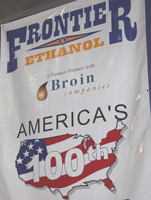According to a release, researchers at Iowa State University have found a way to use mold to convert corn fiber into ethanol. And that could boost ethanol production by about 4 percent or 160 million gallons a year, said Hans van Leeuwen, an Iowa State professor of civil, construction and environmental engineering. “I believe this is a breakthrough,” said van Leeuwen, the leader of the research project. “But I also want to caution that we need to do a lot more research.”
JW Writes
 While domestic fuels have the possibility to stem our dependence on foreign oil, most would agree that it would not be possible to completely supply our need for fuel. Based on our current consumption of oil, more than 90% of the arable land in the US would be required to produce enough ethanol. A large part of the corn and soybeans needed for fuel is being grown in the Midwest.
While domestic fuels have the possibility to stem our dependence on foreign oil, most would agree that it would not be possible to completely supply our need for fuel. Based on our current consumption of oil, more than 90% of the arable land in the US would be required to produce enough ethanol. A large part of the corn and soybeans needed for fuel is being grown in the Midwest.
The effects of climate change bear bad news for farmers in this region. NBC News reported recently that new calculations indicate a shift in the jet stream. The result could mean less perciptitation and an expansion of deserts in areas where they currently exist. People in Oklahoma and Texas are accutely aware of this development following the wildfires earlier this year, and any farmer in the Midwest can probably attest to the lack of rain so far this season. If predictions regarding climate change hold true, it could make it even more difficult to grow our way out of our dependence on oil. However, the competition between using foodstock for fuel and supplying the nation with nutrition could benefit famers able to produce in the new climate.
Ethanol-Mart
 Watch out for falling ethanol prices if Wal-Mart decides to start selling E85. Officials with the world’s largest retailer met recently with ethanol industry representatives to discuss the possibility of offering ethanol at its 383 U.S. gas stations.
Watch out for falling ethanol prices if Wal-Mart decides to start selling E85. Officials with the world’s largest retailer met recently with ethanol industry representatives to discuss the possibility of offering ethanol at its 383 U.S. gas stations.
According to an Associated Press story, Wal-Mart brought together a group of industry, government and academic experts on alternative fuels in Washington last week to discuss how Wal-Mart could develop a network for supplying gas stations at its stores and Sam’s Clubs with E-85 fuel. One of those at the meeting was National Corn Growers Association Executive Director Rick Tolman, who said a decision by Wal-Mart to offer E-85 would help solve one of the emerging industry’s problems: not enough availability for consumers.
Corn Farmers on Ethanol High as Sugar Interests Mull Fuel Future
Corn farmers are “giddy” with the rising use and price of their commodity, according to this article in Business Week from St. Louis.
Meanwhile, Florida sugar cane farmers are still hesitant to jump on the ethanol bandwagon, according to this Sun-Sentinel story, saying “As sexy as ethanol sounds, we’ve got to be able to make a profit.”
That would be the first time I have ever heard ethanol called “sexy.”
Chevron Goes Bio
 Chevron Corporation has formed a biofuels business unit to advance technology and pursue commercial opportunities related to the production and distribution of ethanol and biodiesel in the United States, according to a company release. Chevron officially announced the business unit at a groundbreaking ceremony in Galveston, Texas to inaugurate construction of one of the first large-scale biodiesel plants in the U.S.
Chevron Corporation has formed a biofuels business unit to advance technology and pursue commercial opportunities related to the production and distribution of ethanol and biodiesel in the United States, according to a company release. Chevron officially announced the business unit at a groundbreaking ceremony in Galveston, Texas to inaugurate construction of one of the first large-scale biodiesel plants in the U.S.
Kick It
 Actor and environmentalist Robert Redford has a commentary today on cnn.com about kicking the oil habit. His main purpose appears to be the promotion of KickTheOilHabit.org, which is “based at the Center for American Progress and works with partners from the Natural Resources Defense Council to Consumers Union, MoveOn.org to the Apollo Alliance.” The classy site features ways you can donate, take action and send your message “to Exxon, Chevron, BP, Shell, Valero, and ConocoPhillips, and to your Representative in Congress.”
Actor and environmentalist Robert Redford has a commentary today on cnn.com about kicking the oil habit. His main purpose appears to be the promotion of KickTheOilHabit.org, which is “based at the Center for American Progress and works with partners from the Natural Resources Defense Council to Consumers Union, MoveOn.org to the Apollo Alliance.” The classy site features ways you can donate, take action and send your message “to Exxon, Chevron, BP, Shell, Valero, and ConocoPhillips, and to your Representative in Congress.”
It also features a video that places the blame for everything from higher gas prices to global warming on President Bush. Not necessary at all. This should not be a political issue. If we are truly serious about kicking the habit we all have to work together and make the sacrifices and changes necessary to make us less dependent on foreign sources of oil. Pointing fingers is simply counter-productive. We can all take the blame for our addiction – and take the responsibility of working the program to beat it.
100th Ethanol Plant Celebration

 Approximately 1,200 people attended the grand opening celebration May 26 for the new $80 million Frontier Ethanol – the 100th ethanol plant to begin operations in the United States. The plant, which will produce 60 million gallons of ethanol annually from 21 million bushels of corn, is the 23rd ethanol plant built by Broin Companies. CEO Jeff Broin is pictured cutting the ribbon at the opening celebration. Read more.
Approximately 1,200 people attended the grand opening celebration May 26 for the new $80 million Frontier Ethanol – the 100th ethanol plant to begin operations in the United States. The plant, which will produce 60 million gallons of ethanol annually from 21 million bushels of corn, is the 23rd ethanol plant built by Broin Companies. CEO Jeff Broin is pictured cutting the ribbon at the opening celebration. Read more.
Saab BioPower
 Ethanol can be even more efficient than gasoline with the right engine, and Saab has the engine. According to Mobile Magazine, the 9-5 2.3t BioPower engine runs better on E85 than it does on regular gasoline – 210 bhp compared to 185 bhp. Earlier stories about the BioPower engine, such as this one in Popular Science, say it’s 184 horsepower on ethanol and 148 with gasoline. Pretty good either way. However, Saab currently only has plans to sell cars with the BioPower engine in Europe.
Ethanol can be even more efficient than gasoline with the right engine, and Saab has the engine. According to Mobile Magazine, the 9-5 2.3t BioPower engine runs better on E85 than it does on regular gasoline – 210 bhp compared to 185 bhp. Earlier stories about the BioPower engine, such as this one in Popular Science, say it’s 184 horsepower on ethanol and 148 with gasoline. Pretty good either way. However, Saab currently only has plans to sell cars with the BioPower engine in Europe.
The engine will clearly give the E85 cause a boost, but only in Europe for now. It will appear there in the 2007 model year later this year, but there are no public plans to bring it to the United States.
Hawkeye IPO
 Hawkeye Holdings, the holding company that owns Hawkeye Renewables of Iowa Falls, IA may raise up to $350 million in an initial public offering, according to a Securities and Exchange Commission filing. The company’s prospectus says it is the third largest U.S. ethanol producer based on its 205 million gallons per year production capacity. Read the AP story.
Hawkeye Holdings, the holding company that owns Hawkeye Renewables of Iowa Falls, IA may raise up to $350 million in an initial public offering, according to a Securities and Exchange Commission filing. The company’s prospectus says it is the third largest U.S. ethanol producer based on its 205 million gallons per year production capacity. Read the AP story.
States Pass Biodiesel Laws
 Nearly a dozen states passed legislation this year that will help increase the use of biodiesel, according to the National Biodiesel Board. Among them was Iowa, where Gov. Tom Vilsack today signed into law two renewable fuels and infrastructure bills. One will give point-of-sale retailers a three cent income tax credit on each gallon of a two percent (B2) blend or higher. The second bill establishes a renewable fuels standard, saying sales of ethanol or biodiesel must equal 25 percent of a retailer’s fuel sales by 2020.
Nearly a dozen states passed legislation this year that will help increase the use of biodiesel, according to the National Biodiesel Board. Among them was Iowa, where Gov. Tom Vilsack today signed into law two renewable fuels and infrastructure bills. One will give point-of-sale retailers a three cent income tax credit on each gallon of a two percent (B2) blend or higher. The second bill establishes a renewable fuels standard, saying sales of ethanol or biodiesel must equal 25 percent of a retailer’s fuel sales by 2020.
Other states which passed some kind of legislation favorable to biodiesel are New York, Washington, Colorado, Arizona, Hawaii, Maryland, Kansas, Arkansas, California, Indiana and Virginia.

